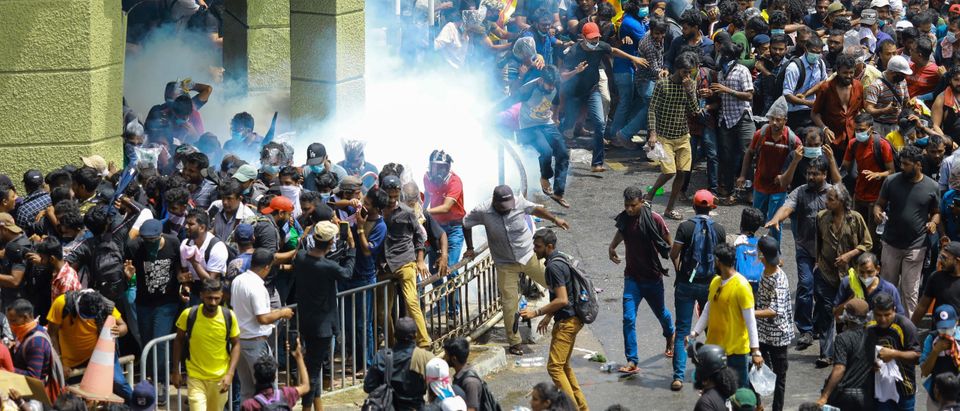UPDATE: This story has been updated to include reports that President Gotabaya Rajapaksa has also agreed to step down from office.
Sri Lanka’s prime minister and president have agreed to step down after mass protests over the dire state of Sri Lanka’s economy forced the country’s president to flee his home.
Sri Lankan Prime Minister Rani Wickremesinghe earlier admitted that the economy had gone “bankrupt,” according to CNN. Fuel and food shortages and extreme inflation prompted thousands of protesters to the Presidential Secretariat and President Gotabaya Rajapaksa’s residence earlier on Saturday, forcing him to flee, in retribution for policies that allegedly contributed to the island country’s economic collapse, the Associated Press reported.
Rajapaksa agreed to step down Saturday, according to Sri Lanka’s parliament speaker, and will officially leave office July 13, The Washington Post reported.
Parliamentary leaders pleaded with the president and prime minister to resign at an emergency meeting Saturday, the Sri Lanka-based NewsWire reported. Wickremesinghe initially rejected calls to step down, the outlet reported.
Protesters enjoying Sri Lanka’s absconding President’s swimming pool! No dictator should remain in illusion that the power is for ever, and when the end comes, it is always violent and nasty. pic.twitter.com/T3ePbkA0gM
— Ashok Swain (@ashoswai) July 9, 2022
Video footage depicted protesters carrying flags, swimming in the president’s pool and overturning barricades, shouting “Gota go home,” the AP reported.
Accusations of corruption have been stirring for months, according to the AP. Sri Lanka’s previous prime minister, Rajapaksa’s brother, stepped down in May after violent protests, the AP reported.
“[Rajapaksa] and his family have been accused of running the country for their own benefit,” Vijay Jayaraj, a researcher at the CO2 Coalition, told the Daily Caller News Foundation. The country’s ban on artificial fertilizers could have been a ploy “to save his face and to reduce the burden of the crunch in foreign currencies to buy imports.”
Sri Lanka’s economy collapsed after a ban on chemical fertilizers, intended to encourage environmentally-friendly organic farming practices, halved agricultural production so that the country was no longer self-sufficient. Global food shortages and a drop in tourism caused by the COVID-19 pandemic caused Sri Lanka to expend its foreign exchange reserves, forcing it into bankruptcy. (RELATED: ‘Destabilization, Starvation’: UN Issues Dire Warning On Global Food Security)
“When the history books are written years and decades from now that will prove a turning point,” Peter Earle, an economist at the American Institute for Economic Research, told the DCNF. “Hopefully there’s a recovery, but I just hope that in the future… policymakers understand that farmers tend to know their business.”
Europe is experiencing similar backlash over policies that ostensibly help the environment.
Over 40,000 Dutch farmers revolted against a government-mandated policy to reduce emissions Monday, obstructing roads and other critical infrastructure and vandalizing government residences. The regulations could devastate the agriculture sector and force a third of livestock farms out of business, DW reported.
All content created by the Daily Caller News Foundation, an independent and nonpartisan newswire service, is available without charge to any legitimate news publisher that can provide a large audience. All republished articles must include our logo, our reporter’s byline and their DCNF affiliation. For any questions about our guidelines or partnering with us, please contact licensing@dailycallernewsfoundation.org.


